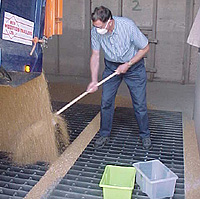Grain sampling techniques criticised

Inadequate grain-sampling techniques could mean growers are incurring unnecessary penalties on low bushel weight wheat this season.
Most laboratories analyse bushel weights using small automatic testers with 250g samples. But after the release of British Standards in 2009, they should be using larger cylinder measures to give a more accurate reading.
“I’m not confident that a 250g sample is accurate enough for the bushel weights we have got this year,” said Guy Gagen, NFU chief arable adviser. “Although these automated machines are perfectly alright in a normal year, laboratories should be using cylinder measures of 0.75-1 litre to give a more robust reading below 68kg/hl.”
Another concern was the use of vacuum spears, he added. “Vacuum spears are not very good practice and people should not be using them.” Even the more commonly used pneumatic spears should also be handled with care. “Sometimes mistakes are made where samples are not properly mixed in the lab before being tested – it is important to get a representative sample mix.”
Farmer Ronald Davison tested a number of wheat samples using a conventional spear at High Elms Farm, Suffolk, with the same loads tested using modern spears upon intake. The difference was marked, with initial samples at 64kg/hl and the same grain testing at 60kg/hl at the end destination.
“It is common sense that a vacuum will suck lighter, poor-quality grain before heavy grain,” he said. “A lot of us have had a poor-quality harvest this year, which has shown up a real problem, and is costing farmers thousands of pounds in false claims.”
Typically, end users deduct £1 per point below 72kg/hl, rising to £2 or more per point below 68kg/hl. “It is not the merchants who are benefiting from this,” said Mr Davison. “It is the end user, but we deserve a fair deal.”
Ian Eastwood, West Country Grain marketing manager, said crops were so variable this year two samples from the same heap could give very different results. “It is frustrating, but most mills are taking the best of the results and basing claims on those, rather than an average.”
A HGCA spokesman said the body would be looking at its grain-sampling recommendations over the winter. “We will then consider what research to commission next. Sometimes you need a bad year to test the systems that are in place.”
